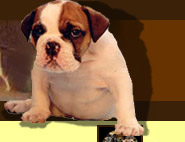We are going to give you plenty of information that may be useful for you as a future breeder, but we have to start with a word of caution here: please think carefully before starting to breed bulldogs (or any other dog breed). There are some good reasons to start breeding bulldogs and there are some bad ones. Please analyze your motivation first, then, once you are sure about what you want to do, get as much information as possible.
Too many dogs end up in situations they do not deserve, mostly because so many neophyte breeders wanted 'puppies of their own', without carefully planning these litters first. There is already a severe pet overpopulation problem in North America and many puppies end up in shelters or are put to sleep everyday.
.
.
.
.
















